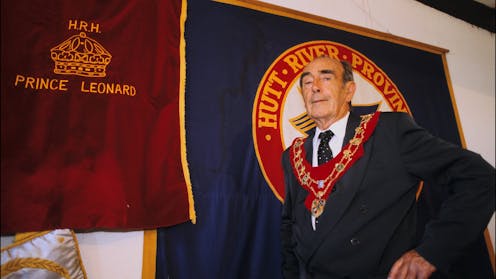Australia’s long history of ‘sovereign citizens’ can be traced to outback WA
- Written by Keiran Hardy, Associate Professor, Griffith Criminology Institute, Griffith University

Outback Western Australia, some time in the 1970s. Picture a huge farm about 500 kilometres north of Perth, with a seemingly endless dirt road to get there.
It’s about as middle-of-nowhere as you can get.
Leonard Casley is a wheat farmer and the Western Australian government has just introduced strict quotas[1] to avoid oversupply of wheat.
Casley has already grown the wheat. He’s not happy.
His solution is to declare his own micronation[2], and name himself Prince Leonard.
This peaceful protest is the first trace of Australia’s so-called “sovereign citizen” movement, which has found itself in the spotlight after proponent Dezi Freeman allegedly murdered two police officers and injured a third.
Q: Tell us about Prince Leonard
Keiran Hardy: Prince Leonard of Hutt River Province was a bit of a character. We’ve seen evidence of the more serious side of sovereign citizen threats recently, but this is a story which is a little bit friendlier, a little bit more eccentric.
He was generally a well-meaning guy who just stuck it to the government and I think people in Australia like that type of a story.
There was also a romantic story with his wife, calling her Princess Shirley, and they would sit on their thrones together.
References
- ^ strict quotas (www.abc.net.au)
- ^ declare his own micronation (www.principality-hutt-river.com)
- ^ Olivier CHOUCHANA/Gamma-Rapho via Getty Images (www.gettyimages.com.au)
- ^ around the start of COVID (www.abc.net.au)
- ^ Waco Siege (www.britannica.com)
- ^ Oklahoma City bombing (www.fbi.gov)
- ^ Treacherous terrain: the search for alleged police killer Dezi Freeman (theconversation.com)
- ^ The 'sovereign citizen' movement is growing. So is the risk of more violence (theconversation.com)
Authors: Keiran Hardy, Associate Professor, Griffith Criminology Institute, Griffith University










